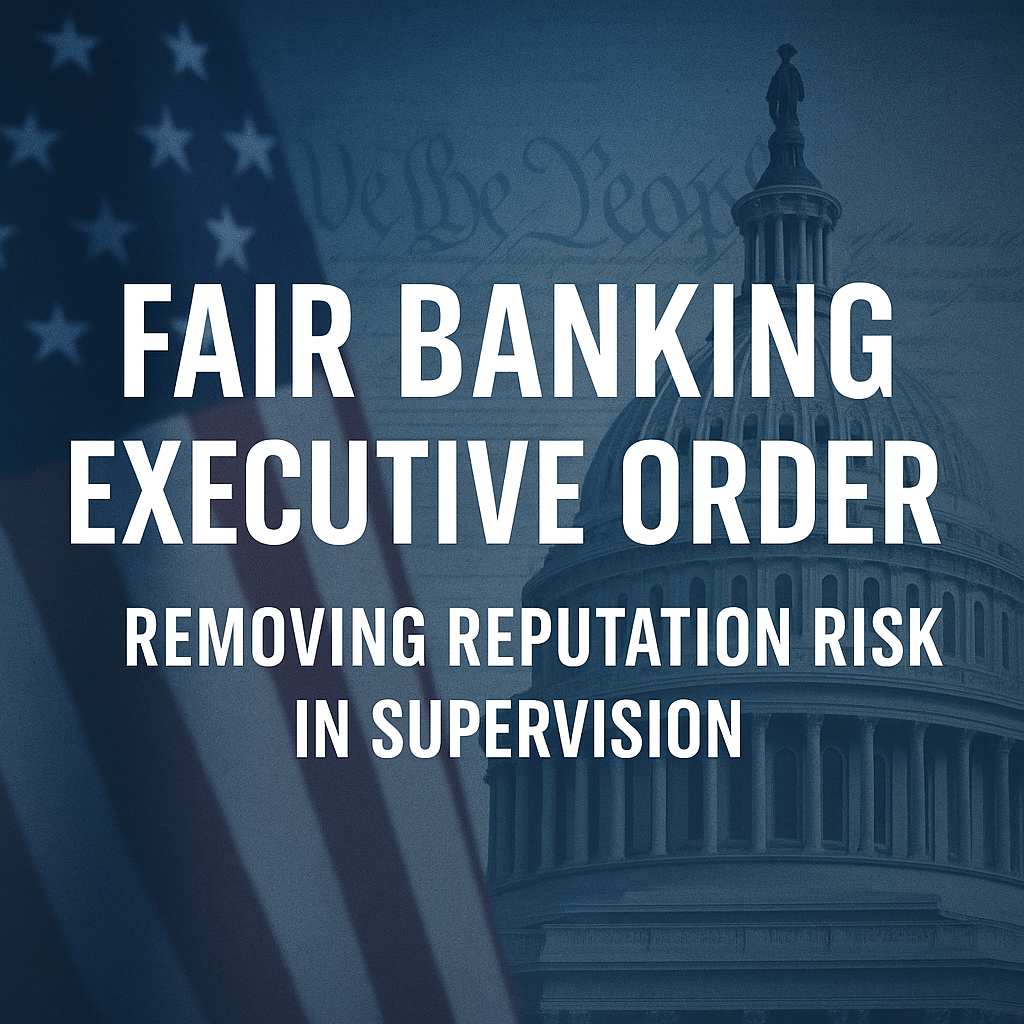Today August 7, 2025, President Donald Trump signed the Guaranteeing Fair Banking for All Americans Executive Order, a directive aimed at restoring objectivity and fairness in bank supervision by eliminating “reputation risk” as a basis for regulator actions. The White House This move responds to longstanding industry concerns that reputation-based evaluations allowed subjective or politically motivated “debanking” decisions that lacked consistent standard.
Under the EO, federal banking regulators (OCC, FDIC, Federal Reserve, NCUA) are ordered, within 180 days, to remove reputation risk or equivalent concepts from their guidance documents—except where required by formal rulemaking—and to ensure that reputation is only considered insofar as it aligns with objective, apolitical, risk-based assessment. The White House
For banks, this signals a tectonic shift: examiners will have to base supervisory judgments more transparently, backed by data and clear criteria. Let’s dig into what this means and how you should respond.
Why This Matters
- Subjectivity trimmed down: Reputation risk language has long given regulators latitude to penalize behavior not clearly tied to safety & soundness. This EO seeks to remove that ambiguity.
- Reversal of “debanking” risk: The order explicitly addresses “politicized or unlawful debanking” allegations, aiming to ensure that banks can’t be pressured to restrict services for ideological or non-risk reasons.
- Proactive compliance advantage: Banks with strong documentation, objective risk metrics, and peer benchmarking will be better positioned under stricter exam standards.
- Potential regulatory rulemaking ahead: Though the EO commands removal from guidance, full regulation changes may follow via notice-and-comment processes.
Key Provisions & Timeline
| Provision | What It Does | Bank Implication |
|---|---|---|
| Remove “reputation risk” from guidance | Regulators must strip references from manuals, publications, examiner directives (unless formal regulation) within 180 days | Banks can no longer be critiqued on vague “reputational” grounds |
| Review past actions | Identify policies that led to politicized/unlawful debanking and notify affected parties within 120 days | Potential exposure for institutions previously warned or restricted under reputation criteria |
| Standardize risk-based assessments | Reputation considerations must align with measurable risk factors—no room for ad hoc judgments | Banks should ensure their risk frameworks are robust and defendable |
| Regulatory coordination & oversight | Conflicts with state-level rules or local mandates will be scrutinized, especially for national banks | Align compliance with both federal and state expectations |
Strategic Implications for Banks
- Revise internal risk frameworks
Review your policies to ensure all assessments are backed by quantitative or qualitative risk metrics—not reputation judgments. - Ensure strong documentation & audit trails
Any supervisory narrative must be defensible in writing: incident logs, board minutes, quantitative metrics, peer comparisons. - Communication & transparency
Update board and executive reporting to reflect clearer criteria that you use for reputational and compliance assessments. - Prepare for examiner questions
Expect examiners to ask: “How did you define risk vs reputation? Show us evidence that no subjective biases affected your decisions.” - Monitor future rulemaking
The EO’s changes to guidance may be followed by formal regulatory changes — be ready to comment or adjust.
In Context: August 2025 Regulatory Shifts
- Gibson Dunn’s Monthly Bank Regulatory Report (August 2025) flagged the EO among their key developments for the month, highlighting its potential to shift agency oversight philosophy.
- The OCC in mid-August announced a series of enforcement actions for unsafe or unsound practices in national banks and individuals, underscoring that removing reputation risk language doesn’t eliminate accountability.
- In parallel, banks have started lobbying for national standards to curb state-level “debanking” rules, tying into the same theme of uniform treatment and limiting subjective state influence.
- Some banks and observers already view the EO as part of a broader deregulatory posture under the current administration.
How Saturn Partners Can Help
At The Saturn Partners, we help banks convert regulatory changes into strategic opportunity—not compliance liability. Here’s what we bring:
- Guidance review & gap analysis — audit your policies and alignment to the EO’s requirements
- Risk model refinement — help you separate quantifiable risk metrics from narrative reputation language
- Exam narrative coaching — craft defensible exam arguments and prepare management for scrutiny
- Stakeholder communications — assist drafting comment letters or internal memos ahead of rule changes
Want to ensure your bank transitions cleanly into this new exam regime? Let’s design your “fair banking” compliance path.

